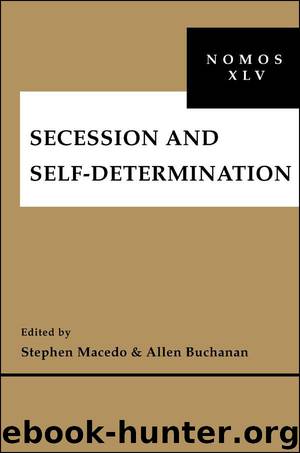Secession and Self-Determination (Nomos) by Stephen Macedo & Allen Buchanan

Author:Stephen Macedo & Allen Buchanan [Macedo, Stephen]
Language: eng
Format: mobi
Publisher: NYU Press reference
Published: 2003-11-30T16:00:00+00:00
IV. CONCLUSION
Liberal democracies have to take the challenge posed by multilingualism seriously. The inevitable linguistic dimension of the state and hence the impossibility of linguistic state neutrality is a source of valid concern if we are willing to recognize that language security or the option for people to live in their language is something that most people cherish as important for the possibility of living a fully meaningful life. Because in the past secure belonging to a national community with a national language has often been taken for granted as a shared experience, and because the assumption has generally been false, multicultural theorists are now struggling to create a space for the explicit recognition of language rights.
Once this is acknowledged, the question becomes how to identify which groups should be linguistically accommodated and in which state. In a world divided by states encompassing both autochthonous majorities and minorities, it could make sense to recognize that the cultural needs of autochthonous minorities have to be accommodated within the larger state unit so that the state can claim authority over the people and the territory (i.e., so that it can legitimately claim to be “their” state), especially since cultural and linguistic neutrality is not an option. Because each state contains a limited number of ethnocultural groups with historically grounded claims to cultural self-preservation linked to a past of annexation or conquest, the accommodation of their cultural maintenance claims would be much less divisive than is often assumed by critics of every form of multiculturalism, especially when one compares it to the alternative of nonrecognition and the costs and strains that it implies.
Gross unfairness in the distribution of the most cherished assets among states (wealth, peace, democracy, public health, etc.) and the failure of the international society to face even minimal obligations of redistribution bring in additional considerations. Large flows of immigrants, refugees, and displaced persons are forced to abandon the secure cultural context that their national cultures offer them. Also, more and more, an integral element of the definition of the “better life” that immigrants strive for is a certain lifestyle interestedly exported by the wealthiest countries in unfair conditions of power over trade and the media. In this scenario, the question as to the responsibility of each individual state that receives and benefits from immigration from less affluent countries to allow for possible claims of cultural reproduction becomes salient.
For the reasons I mentioned, deciding how to concretize this generic international responsibility of the well off versus the least well off and of the cultural imbalances it generates is not an easy task. On the other hand, once the full disclaimer underlying the argument of the free nature of migration is given up, there is a need to find a set of normatively sound criteria to decide which linguistic groups should be granted accommodation rights. Here I have suggested that numbers and geographical concentration matter as feasibility conditions. I have also argued for the importance of ascertaining that whatever claims of cultural
Download
This site does not store any files on its server. We only index and link to content provided by other sites. Please contact the content providers to delete copyright contents if any and email us, we'll remove relevant links or contents immediately.
| Anarchism | Communism & Socialism |
| Conservatism & Liberalism | Democracy |
| Fascism | Libertarianism |
| Nationalism | Radicalism |
| Utopian |
The Secret History by Donna Tartt(19088)
The Social Justice Warrior Handbook by Lisa De Pasquale(12190)
Thirteen Reasons Why by Jay Asher(8909)
This Is How You Lose Her by Junot Diaz(6886)
Weapons of Math Destruction by Cathy O'Neil(6279)
Zero to One by Peter Thiel(5801)
Beartown by Fredrik Backman(5754)
The Myth of the Strong Leader by Archie Brown(5507)
The Fire Next Time by James Baldwin(5444)
How Democracies Die by Steven Levitsky & Daniel Ziblatt(5218)
Promise Me, Dad by Joe Biden(5153)
Stone's Rules by Roger Stone(5087)
A Higher Loyalty: Truth, Lies, and Leadership by James Comey(4962)
100 Deadly Skills by Clint Emerson(4925)
Rise and Kill First by Ronen Bergman(4788)
Secrecy World by Jake Bernstein(4753)
The David Icke Guide to the Global Conspiracy (and how to end it) by David Icke(4717)
The Farm by Tom Rob Smith(4508)
The Doomsday Machine by Daniel Ellsberg(4490)
